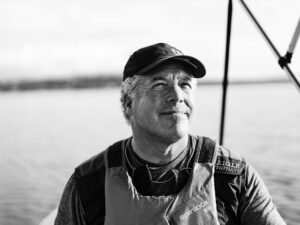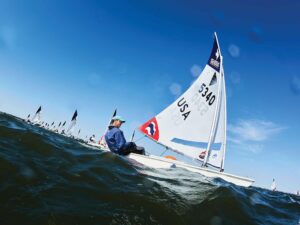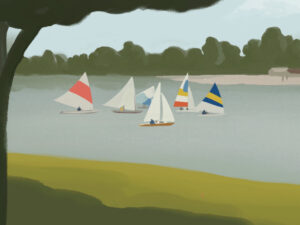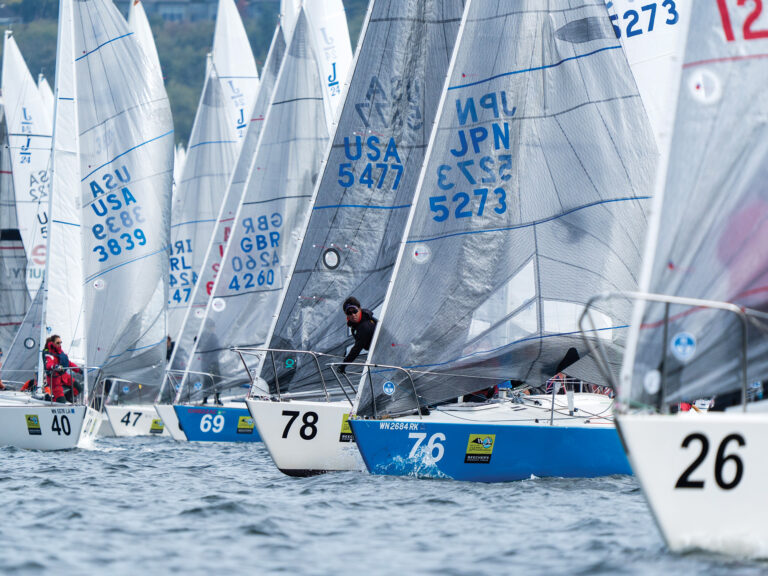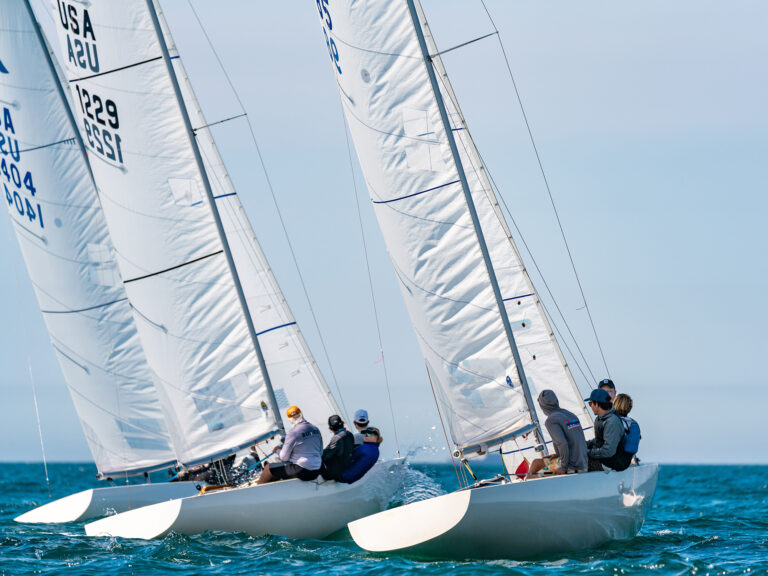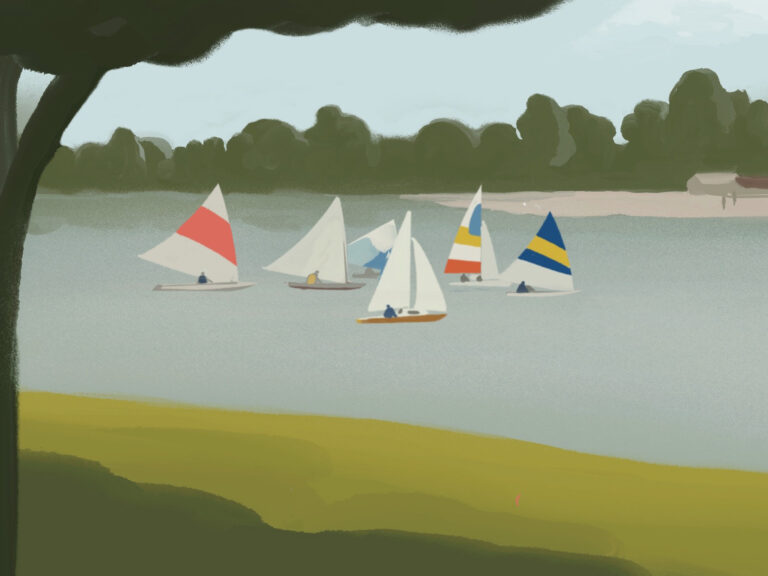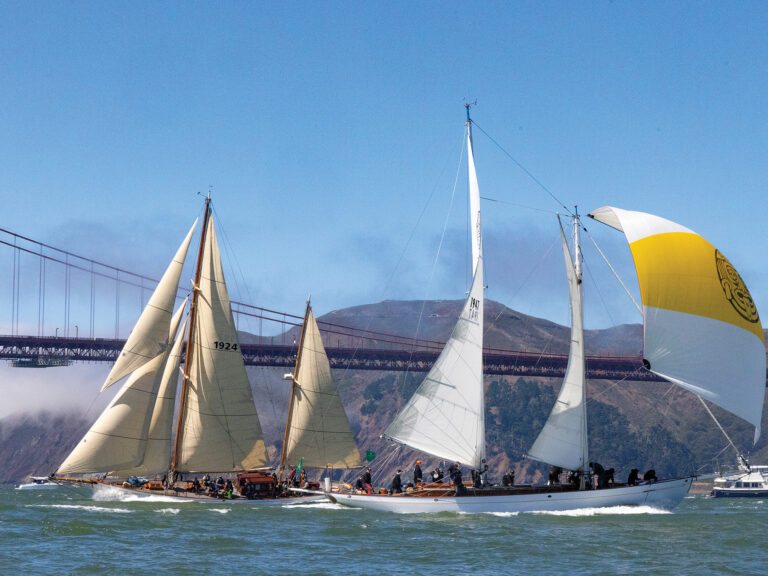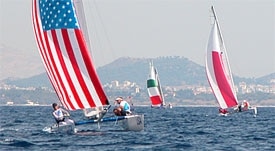
Olympic0828
ATHENS–There was some initial disappointment for John Lovell and Charlie Ogletree. The U.S. Tornado team came into the final race of the 2004 Olympic Regatta with a shot at gold. They gave it their best effort, and came up short, due largely to an outstanding performance from Roman Hagara and Hans Peter Steinacher of Austria. But the disappointment faded quickly as the realization sunk in that after sailing together for over 11 years through three Olympic campaigns, they had finally realized their dream of winning an Olympic medal. “As soon as the race was over we had our heads down a little bit,” said Ogletree. “But as we get to shore and start talking to the press, our friends, and our family, it’s all starting to be pretty good.” The disappointment will last a little longer for the U.S. Star team of Paul Cayard and Phil Trinter. They started the day with an outside chance at a silver or a bronze, but they needed a strong race and some help from the fleet. They didn’t get either, finishing last and dropping from fourth to fifth in the overall standings. It was a day, Cayard, said, when everything seemed to go wrong. “We got tangled up,” he said of the start. “The Spanish guy did something I really didn’t expect. He wasn’t trying to do anything to me, I don’t think. We were on port going away from the left end of the line, with a 1:15 to go, and we were only six boatlengths from the away from the left end of the line and he wanted to tack. He came up right in front of me and we got pushed into Mansfield [of Ireland]. So we had a bad start there.” Already behind the pack, Cayard and Trinter tried to work to the left side, which they expected to be favored as the wind, which had been gradually losing strength through the mid-day, continued to drop. However, the right came in and by the first mark, the were in 15th, 4:40 off the lead. One of the two boats they needed to catch, Canadians Ross MacDonald and Mike Wolfs, were in second. The other, Xavier Rohart and Pascal Rambeau of France, were in 12th, but 1:20 ahead of Cayard and within reach of the pack. In the end MacDonald and Wolfs would hold on to second to secure a silver, a nice end to MacDonald’s Olympic career, which includes five appearances and a bronze medal, while the French team would work up to seventh to secure the bronze. Even if Cayard and Trinter had won the race, they still wouldn’t have won a medal. “The Olympics is such a once in a lifetime kind of thing, at least for me in my country,” Cayard said, “I really hoped to do a great regatta like I did at my trials and I just never really got into the groove. Started off in a really good groove and the third race, coming into the weather mark, maybe we made a bad decision there, and maybe that was a sort of unraveling of things.” That third race was the one where Cayard and Trinter came in on the port layline, and ended up running afoul of one boat while trying to round the mark, and then another while doing a 720. A solid mid-fleet position was quickly turned into a throwout. Lovell and Ogletree also struggled at the start of the final race. This wouldn’t have been a bad thing if there’d been able to make the Austrians struggle more. Needing to make up four points to take over the lead, Lovell and Ogletree had the option of trying to match race the Austrians and hold them back while the fleet sailed around the course. A 13th or worse for Hagara and Steinacher would mean gold for the Americans. However, the Tornado is not a very apt match-racing tool, and Hagara and Steinacher proved quite slippery during the pre-start. With a minute to go, Lovell and Ogletree realized they needed to shift their focus to getting a good start for themselves. It was a decision they made a touch too late as they wound up pinned behind two boats as the gun fired. “We had been circling with the Austrians so much that it was a last-minute try, a desperate try to get in there and get a good start,” said Lovell. “But there wasn’t much we could do at that point. It was too late in the starting sequence.” The Austrians didn’t have a stellar start, and for a brief moment it appeared as if Lovell and Ogletree might be able to gain control as they led the Austrian team toward the favored right side. But then another boat tacked in a position that forced the Americans back to starboard and allowed the Austrians to continue toward the right corner. The Austrians had a 24-second lead on the Americans at the first mark, but then found a really solid vein of wind on the first run and added nearly two minutes to their advantage. Hagara and Steinacher, in a sizzling display of their speed in light air, won the race, emphatically claiming their second gold in the class. Lovell and Ogletree finished 10th in the race. The Argentine team of Santiago Lange and Carlos Espinola finished third in the regatta. Once again, Great Britain dominated the nations’ medal standings in sailing. The two gold, one silver, and two bronze won by the British sailors was nearly a match for their prodigious haul in Sydney, three golds, and two silvers. The U.S. finished with two medals, one of seven countries to do so. Spain, who won three, can claim to be second best, while Brazil, with two golds, edges the U.S. for third. Austria and Greece also won one gold and one silver. The U.S. will probably win the award for most near misses, with the Women’s 470, 49er, and Star teams all finishing fifth, one or two bad races from winning a medal. Results of Interest All Classes Have Finished Racing Tornado (17 boats) Oskar Johansson/John Curtis (CAN): (14, 15, 4, 13, 8, 12, 14, (17), 17, 4, 13) 15th Enrique Figueroa/Jorge Hernandez (PUR): (5, 9, 7, 8, 2, 5, 9, 12, (14), 10, 5) seventh John Lovell/Charlie Ogletree (USA): (2, 2, 1, 6, 9, 9, 6, 7, 1, 2, (10)) second Star (17 boats) Peter Bromby/Lee White (BER): ((17), 16, 8, 11, 12, 10, 6, 4, 1, 3, 11) eighth Torben Grael/Marcelo Ferreira (BRA): (5, 4, 1, 1, 2, 5, 2 6, 11, 4, (DNC)) first Ross MacDonald/Mike Wolfs (CAN): (7, 11, 4, 3, 1, RDG/5.2, 8, (14), 8, 2, 2) second Paul Cayard/Phil Trinter (USA): (1, 6, 15, 10, 3, 6, 1, 15, 6, 8, (16)) fifth 49er (19 boats) Tim Wadlow/Pete Spaulding (USA): (7, 8, 5, (OCS), 9, 9, 8, 3, 1, (13), 7, 3, 10, 11, 1, 10) fifth Men’s Mistral (34 boards) Peter Wells (USA): (22, 20, 23, 16, 22, 29, 28, 24, 28, (31)) 28th Women’s Mistral (26 boards) Karla Barrera (PUR): ((26), 24, 25, 26, 23, 25, 26, 26, 26, 25, 24) 26th Lanee Beashel (USA): (13, 16, 9, 18, 17, 14, 6, 14, (19), 15, 5) 16th Finn (25 boats) Richard Clarke (CAN): (10, 18, 15, 22, 19, 15, (OCS), 14, 8, 11, 2) 18th Ben Ainslie (GBR): (9, (DSQ), 1, 1, 4, 1, 2, 3, 2, 1, 14) first Dean Barker (NZL): (5, 10, 7, 11, 7, 16, (OCS), 12, 19, 20, 10) 13th Kevin Hall (USA): (11, 6, 13, (17), 16, 14, 13, 9, 9, 17, 7) 11th Europe (25 boats) Meg Gaillard (USA): (9, 11, 13, 9, 3, 13, 11 (16), 9 (19), 19) 14th Laser (42 boats) Robert Scheidt (BRA): (3, (8), 1, 3, 8, 4, (19), 12, 7, 3, 6) first Bernard Luttmer (CAN): (15, 25, 22, 21, 27, 33, 31, (DNF), 9, 32, 30) 29th Timothy Pitts (ISV): ((42), 40, 41, 40, 36, 39, 37, 34, 34, 40, 40) 41st Hamish Pepper (NZL): (24, 9, (26), 11, 9, 5, 13, 3, RDG/11.3, 2, 21) seventh Mark Mendelblatt (USA): (2, 14, 20, 6, 6, 10, (29), 22, 16. 6, 9) eighth Men’s 470 (27 boats) Paul Foerster/Kevin Burnham (USA): (1, 8, 2, 15, 9, 4, 3, 7, 18, 4, (23)) first Women’s 470 (20 boats) Jen Provan/Nikola Girke (CAN): (4, 13, 17, 11, 12, 7, 2, (19), 6, 19, 12) 13th Katie McDowell/Isabelle Kinsolving (USA): (12, 16, 3, 12, 9, 2, (18), 17, 8, 1, 4, ) fifth Yngling (16 boats) Paula Lewin/Peta Lewin/Christine Patton (BER): (4, 15, 6, 13, (16), 14, 9, 16, 16, 11, 4) 15th Lisa Ross/Chantal Leger/Deirdre Crampton (CAN): (13, 9, (15), 15, 12, 12, 12, 14, 15, 2, 12) 16th Carol Cronin/Liz Filter/Nancy Haberland (USA): (2, 10, 16, 9, 15, 10, 1, 15, 7, 1, (OCS)) 10th

